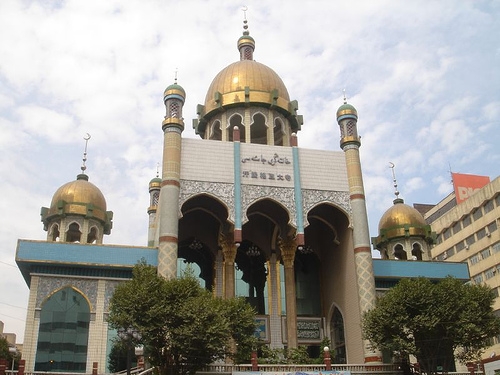Among the Uighurs of Xinjiang, Islam provides a community bond that the Chinese government cannot.
On Friday, following nearly a week of demonstrations and counter-demonstrations in which over 1000 people were injured and more than 150 killed, police blocked worshippers' access to mosques all over the city of Urumqi, capital of the Xinjiang Uighur Autonomous Region of China. Thousands of Muslims, mostly members of the Uighur ethnic group, demanded access to their mosques. Eventually, the police opened the mosque doors, but warned worshippers to say their prayers quickly and leave.
The authorities closed the mosques because they fear the unrivalled power of Islam in Xinjiang to bring people together. Historically, Islam has provided the framework for countless social and political movements in Xinjiang since it came to the region in the 10th century. Islamic institutions have provided education, morality, community cohesion, and political legitimacy. Friday prayers have been the site of sermons that have inspired rebellions and revolutions. Islam is an integral part of Uighur life in Xinjiang. Today, even the most secular Uighur, who do not adhere at all strictly to Islamic law, identify strongly as Muslims.
Attending Friday mosque is just one of many popular Islamic traditions that tie Uighurs' lives together. For example, as in Central Asia and Pakistan, Uighur regularly visit the tombs of Islamic saints. The state is appropriating many of these sites, some of which are pre-Islamic, for tourism and simultaneously working them into a history of Xinjiang that legitimises Chinese control.
Other popular Islamic Uighur rituals fill roles that the government cannot. One, called the mäshräp, brings men together to perform, to read and discuss the Qur'an, and to mete out punishments for immoral behaviour in the community. In the city of Ghulja in the mid-1990s, these organisations became very influential, as they were popularly recognised as a force for positive social change, especially in addressing alcoholism and drug abuse. The groups even began to establish football clubs. In February 1997, the authorities cracked down on the groups, calling them illegal separatist gatherings. The government used football pitches for tank exercises and then cracked down violently on the subsequent protests. The groups became victims of the state's imperative to control every aspect of public life.
The Chinese government places significant restrictions on religious life. In accordance with the law, none of the people who demanded to be let into their mosques on Friday were under the age of 18. Nor, by law, were any of them women, traditionally in charge of early Islamic education in the home. Nor are any members of the ruling Communist party allowed to participate even in permitted religious activities, which are organised exclusively by state organs, such as the Islamic Association of China. Students, too, are banned from practicing, and recent years have even seen universities lock their gates at prayer times or require their students to attend meals during Ramadan. Chinese citizens visit Mecca only through state-organised "Hajj tours".
With the opening up of China, however, has come the opening of Xinjiang to currents of thought in the greater Islamic world. As Uighur have increasingly travelled abroad, while finding their religion limited at home, their interest in the Islam of the Middle East has grown. Arabic textbooks are multiplying. Reformist and mostly non-violent fundamentalist philosophies are finding new adherents among the Uighur.
Perhaps this is the real worry of the Chinese administration: that efforts to restrict the power and reach of Islam in Xinjiang have made it a stronger rival for the domination of public space. Indeed, faith, more than separatism or ethnic strife, seems to induce much of Uighurs' discontent. To take one example, a March 2008 protest in the city of Khotan, labelled a separatist demonstration by the government, seems to have begun over rumours that the wearing of the veil was to be restricted. We may never know all of the reasons for the events of the past week, but we may be assured that the Uighur demonstrations, seemingly so unexpected by the authorities, came about in part through the hidden world of Islam.
By Guardian



